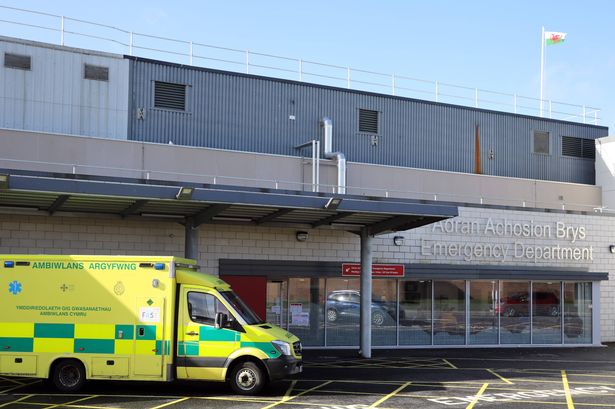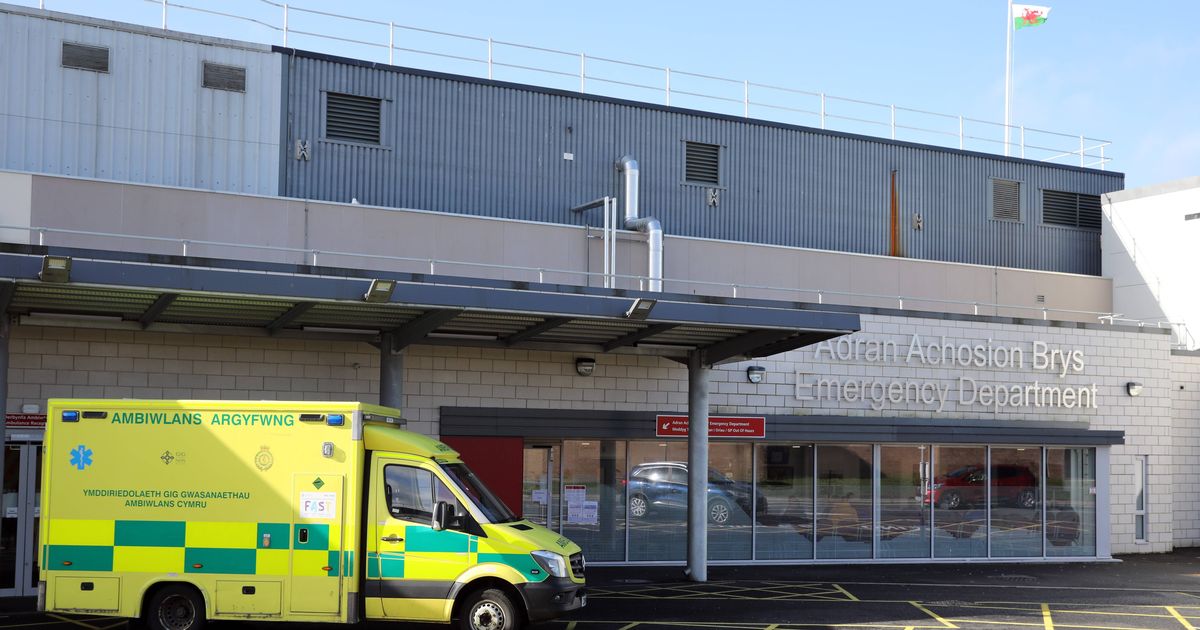Inspectors found medication stored at unsafe temperatures, expired or wrongly stored items on the resuscitation trolley, and inadequate staffing in the paediatric area at Ysbyty Gwynedd in Bangor Ysbyty Gwynedd in Bangor(Image: Ian Cooper)
Ysbyty Gwynedd in Bangor(Image: Ian Cooper)
Serious patient safety concerns have been raised by inspectors after an unannounced visit to a Welsh hospital. Issues identified at the emergency department at Ysbyty Gwynedd included medication storage temperatures exceeding safe thresholds, expired or improperly stored items on the resuscitation trolley, and inadequate staffing and oversight in the paediatric area.
Delays in discharges from other areas of the hospital in Bangor meant some patients waiting more than 36 hours at the accident and emergency unit and some are treated on trolleys, inspectors found.
The team from Healthcare Inspectorate Wales visited the hospital, run by Betsi Cadwaladar University Health Board, over three days in April and published its report into findings today, Thursday, July 24. Sign up for our free daily briefing on the biggest issues facing the nation sign up to the Wales Matters newsletter here
Inspectors assessing the quality and safety of care provided to patients attending the department also found it “concerning” that patients with weakened immune systems were sometimes cared for in open areas, increasing their risk of infection.
“We saw a patient who was receiving chemotherapy being cared for in an open area of the ED when they should have been accommodated in a cubicle to reduce the risk of infection,” the inspection report says.
“The health board must ensure that patients presenting at ED who are receiving chemotherapy treatment, or who are immunocompromised are appropriately accommodated, to reduce the risk of harm.”
There was also concern about patients treated on trolleys. This is an issue in pressured hospitals across Wales that has been raised before by medics and others.
And not all patients at Ysbyty Gwynedd’s A&E department were triaged within the recommended 15-minute window. This led to delays in specialty reviews and ambulance patient transfers into the department, which impacted patient flow and safety, inspectors warned.
“There were significant challenges with patient flow through the department. This was due, in the main, to delays in discharging patients from other areas of the hospital, which meant there were insufficient numbers of spaces to move patients into.
“Consequently, patients were spending over 36 hours in the department. However, this should be regarded in the context of national pressures on emergency departments and is not unique to Ysbyty Gwynedd.
“Nevertheless, the health board must ensure prompt triage of patients upon arrival at the department, to maintain patient safety,” inspectors said.
HIW also found “a lack of staff oversight of the paediatric area.” The area was staffed by one adult trained nurse with no paediatric training. The area was often left with no staff in attendance whilst the nurse undertook triage, transferred patients, or went on a break.
Inspectors said this is not in line with Royal College of Emergency Medicine guidance which specifies that there should always be two paediatric trained nurses in this area when children are accommodated
Describing staff across the accident and emergency department as “committed and resilient” and the unit as “clean and well-maintained” HIW found that it had improved since the last inspection in 2023.
But inspectors said it was impacted by pressures affecting emergency departments generally across Wales.
“As with most EDs across Wales, the inspection identified ongoing systemic challenges affecting the department, impacted by poor patient flow through the hospital, due to delays in discharging patients.
“Regardless of these challenges, inspectors observed several positive improvements since the previous inspection in August 2023, and clear examples of learning from the issues identified previously,” the report says.
And it goes on: “Staff were seen to communicate clearly with patients and made every effort to treat them with dignity and compassion and maintain their privacy to the best of their ability.
“However, this was more challenging for those cared for on trolleys in areas not designed to provide patient care, such as corridors. Most patients were generally positive about their interactions with staff, although many expressed frustrations with long waiting times.”
The report found areas of good practice include effective communication between staff, a designated pharmacist, occupational therapy and physiotherapy support, and proactive escalation of unwell patients.
Leaders were “visible and supportive” although staff reported feeling unsupported by senior management outside the department.
Staff also raised concerns about violence and aggression from patients, lack of breaks, and inconsistent access to training and development.
“Despite the overall challenges, inspectors found evidence of a committed and professional team working hard to deliver safe and compassionate care in a high-pressure environment,” inspectors said.
“Staff also described the culture within ED as positive, inclusive and team-oriented, with strong camaraderie and mutual respect across roles.
“Many staff expressed pride in their work and confidence in their immediate managers, who were seen as approachable and hands-on.
“The visible leadership and willingness to support on the floor during peak times was particularly valued.”
A total of 28 areas for improvement were identified, and the health board has submitted a comprehensive improvement plan, which HIW has accepted. Progress on these improvements will be monitored as part of HIW’s ongoing assurance work.
Alun Jones, Chief Executive of Healthcare Inspectorate Wales, said: “The pressures seen in this department reflect a wider national picture, where patient flow and overcrowding continue to challenge emergency care services across Wales.
“This inspection highlights the dedication of staff at Ysbyty Gwynedd Emergency Department in delivering compassionate care under pressure.
“However, it also identifies concerns that must be addressed to improve patient safety and staff wellbeing. We will continue to engage with Betsi Cadwaladr University Health Board to ensure progress against our findings.”
Responding to the inspection report Dr Pete Williams, consultant in emergency medicine and clinical lead at the emergency department at Ysbyty Gwynedd, said: “We welcome the findings of the recent unannounced inspection by Healthcare Inspectorate Wales and are pleased that the report acknowledges the positive improvements made since the last inspection.
“I am particularly proud that the inspectors recognised the dedication and compassion of our hardworking team, who consistently provide high-quality care in what is often a very challenging and high-pressure environment.
“We are acutely aware of the ongoing and well-documented challenges around patient flow, which affect emergency departments across the UK. Providing care to patients who are waiting on the corridors before being admitted to hospital is not a situation any of us want to be in, but I want to reassure our patients and their families that their safety and care remain our top priorities. Our team continues to deliver safe and compassionate care despite these pressures.
“We are working closely with local authorities, third sector organisations, and other partner agencies to improve patient flow enabling people to return home. These collaborative efforts are focused on supporting timely and safe discharges, which in turn help the emergency department function more efficiently.
“This work is focused on improving patient safety and experience throughout their journey, including patients being brought into hospital by ambulance to be transferred into the department quickly to reduce lengthy waits in ambulances and free the ambulance teams to respond to people within the community. ”
He said that in response to some of the patient safety concerns raised in the report these actions have been taken:
- Identifying a dedicated isolated area for patients with lowered immunity is a challenge for our emergency department. We are working with our cancer division across the health board to establish better pathways for assessment and treatment outside of the emergency department for our most vulnerable patients, which will aim to minimise infection risk. When patients do have a need to attend the department staff are making every effort to identify appropriate locations within the department to reduce the risk of infection.
- The medication storage system identified in the report was immediately rectified. We now have continuous temperature monitoring in place and have introduced an escalation process if temperatures fall outside of safe thresholds.
- The paediatric area within the department has been reconfigured to improve staff oversight and ensure a safer environment for our younger patients.
- We recognise that consistently achieving the recommended 15-minute triage window is challenging, particularly during peak periods. To address this, we have strengthened oversight of triage by the nurse in charge and introduced a formal escalation process that guides the temporary reallocation of staff to support triage when required.
- Finally, we have developed a business case that presents the recommendations to secure sustainable staffing levels in the Emergency Department, reducing our reliance on agency staff.
“We remain absolutely committed to making ongoing improvements in our department and delivering safe and compassionate emergency care for our patients. I am incredibly proud of the dedication and professionalism shown every day by the team in our emergency dDepartment.
“We thank Healthcare Inspectorate Wales for their overall very positive visit; their valuable feedback will help us continue to enhance and improve our service for the communities we serve.”
